“This is where your people were held, by mine.”
-Curtis Flowers, great-great-great-grandaughter of Sarah and James Jackson, owners of the Forks of Cypress plantation, speaking with Black descendants of those enslaved at the site
So begins one of the opening lines of Echoes of the Forks of Cypress, a powerful documentary that follows the journey of Black and White descendants of the iconic North Alabama plantation, as they reckon with their shared past to bring about healing and community in the present.
The film, which was funded in part by the Alabama Humanities Alliance’s Healing History initiative, had its Alabama premiere on August 12, 2025, at the Florence-Lauderdale Public Library. Around 125 people attended the debut, far exceeding the library’s viewing area for the screening. Chairs were hauled from all corners of the library, and some people sat with obstructed views, or no views at all — demonstrating the local appetite for history, genealogy, and community-building.
As noted by Laura Anderson, AHA’s director of partnerships and outcomes, the project embodies the ideals of AHA’s Healing History initiative: “When we started this effort two years ago, we didn’t really want to define all that is “Healing History” because we wanted people around Alabama to come together and define that for themselves and their communities, and then come to us for support.”
And that’s exactly how AHA’s funding for Echoes of the Forks of Cypress came about.
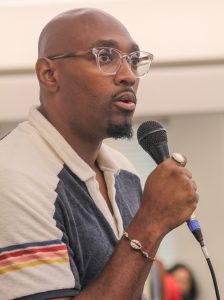
Brian Murphy, director of Florence Arts & Museums — a frequent AHA partner and grant recipient — told Anderson about a Southern filmmaker who had recently discovered that some of his ancestors were once enslaved at the Forks of Cypress. The filmmaker was working with one of the White descendants of the Jackson plantation at the Forks to research his line there, as much as possible. He also had an idea to bring White and Black descendants together with a goal: To reimagine the plantation and its cemetery as spaces for remembrance and reflection — to have challenging conversations and acknowledge the site’s painful legacy, but also to cultivate new paths forward for healing and understanding with one another.
That filmmaker was Frederick Murphy, founder of History Before Us, a production company focused on capturing, preserving, and advocating for influential history. AHA supported Murphy’s vision with a Healing History grant, making the production of Echoes possible.
One of Muprhy’s primary objectives for the project was to help other Black descendants trace their own family lines that ran through the Forks of Cypress.
“Genealogy for people of African descent can be challenging due to gaps and erasures in historical records,” Murphy says. “Collaboration between descendant communities on all sides, paired with shared knowledge and persistence, helps restore lost connections and reclaim ancestral legacies.”
Over the past year and a half, Murphy’s work has brought together folks from across Florence and the Shoals — and far beyond — connecting descendants.
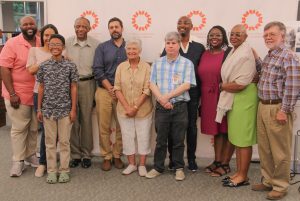
The work also pulled in many other Shoals residents interested in learning more about the iconic site’s full history and how learning about that past can strengthen the region’s present. Allies joined in: The Alabama Historical Commission, Florence Arts and Museums, Florence-Lauderdale Public Library, and community historians, archivists, and genealogists from local churches, historical societies, and more.
“This project,” Murphy says, “was about showing that people can work together and do something that is emotionally charged — that can make us angry but can also bring us joy and happiness — and, more importantly, it hones in on what I center my life around, and that is our shared humanity.”
Going beyond the film
Following the film’s screening, Murphy and Anderson led a wide-ranging community conversation in the Florence library. Descendants answered questions from the audience, and from each other. And audience members shared ideas that the film had inspired in them, including ways to connect the Forks work with other citizen-led, community projects: genealogy workshops, cemetery preservation, oral history projects, books, new mapping efforts, and more.
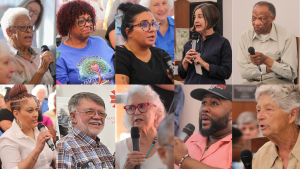 Community members also shared their personal responses to the film.
Community members also shared their personal responses to the film.
One woman, Andrea Blackstone, had come all the way from Virginia after learning she had enslaved ancestors at the Forks. She told Murphy that he “did something for me, with this film, that I’ve waited for most of my life.” She was there with her son, who was celebrating his 12th birthday, documenting the evening with photos aplenty on his new camera. “You have also reinforced that we need to keep doing this work because we all need to know where we come from. This is the day that I get to say I understand me a little better.”
Another woman, a lifelong resident of the Shoals, shared how the film and conversation made her aware of this local history for the first time in her life: “I’ve lived around the Forks of Cypress forever and I didn’t know all this. To see your faces, to hear your stories, to meet you — it’s so powerful. It’s moving and at the same time, I wish I had known this so much sooner. Thank you. That’s what I want to say. Thank you. This has changed me.”
Murphy is planning more screenings of Echoes in Alabama and across the South, before the film heads to a streaming platform for wider release. You can watch a trailer of the film here.
You can also read a deeper dive about Echoes of the Forks of Cypress in AHA’s 2024 issue of Mosaic magazine.
About AHA’s Healing History initiative
This collaborative initiative is designed to strengthen our communities, workforces, and state by helping Alabamians examine their shared history and get to know each other better. Across race, religion, politics, and all the supposed dividing lines that shouldn’t keep us apart. The aim is to build trust, foster empathy, and grow community through mutually respectful discussions about our shared past, present, and future. AHA is grateful to the Community Foundation of Greater Birmingham for its significant support for this initiative.
See below for more on ways to engage with Healing History. You can also learn more at alabamahumanities.org/healing-history.
Past Forward: AHA offers Past Forward as a participatory introduction to Healing History. This experience offers a chance to explore, and reflect upon, our shared history — and consider how decisions made in the past affect our lives, livelihoods, relationships, and communities today.
Upcoming Past Forward opportunities:
- August 25, 2025: Birmingham (Red Mountain Theatre)
- September 11, 2025: Birmingham (Alabama Humanities Alliance)
- November 20, 2025: Bessemer (Bessemer Public Library)
Woven Together: Woven Together is a series presented by the Community Foundation of Greater Birmingham, Leadership Birmingham, and the Alabama Humanities Alliance. Our next event will take place on August 25, at Birmingham’s Red Mountain Theatre: Outraged: Why We Fight About Morality and Politics — and How to Find Common Ground.
The event features author and social psychologist Kurt Gray, who will unpack the science behind our outrage and reveal how empathy, not division, can drive real dialogue. You’ll discover why we’re more alike than we think, and how understanding our emotions can bridge even the deepest divides — no matter where we reside on the political, religious, or geographical spectrums.
Tickets are $10 and you can purchase them here.
About the Alabama Humanities Alliance
Founded in 1974, the nonprofit and nonpartisan Alabama Humanities Alliance has served as a state affiliate of the National Endowment for the Humanities. Through our grantmaking and public programming, we promote lifelong learning, impactful storytelling, and civic engagement. We believe the humanities can bring Alabamians together and help us better understand the communities we call home.
*Our thanks to the Florence-Lauderdale Public Library for the photos used in this story.

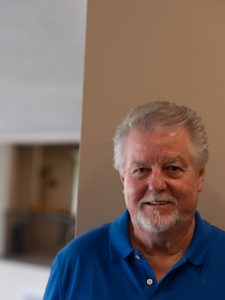 This project gives Alabama coal miners the chance to share their memories — and artifacts — as part of a project to preserve our state’s coal mining history. Organized by the University of Alabama’s Department of History, this project will also give miners the chance to scan, and preserve, artifacts like photos, letters, mining lamps, helmets, lunch buckets, and more.
This project gives Alabama coal miners the chance to share their memories — and artifacts — as part of a project to preserve our state’s coal mining history. Organized by the University of Alabama’s Department of History, this project will also give miners the chance to scan, and preserve, artifacts like photos, letters, mining lamps, helmets, lunch buckets, and more.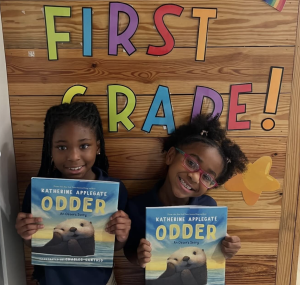 Newberry Award-winning author Katherine Applegate visits Birmingham to speak with students at i3 Academy, Avondale Elementary, and Shades Cahaba Elementary. AHA funding provides hundreds of local students with signed copies of Applegate’s new picture book, ODDER, to foster a love for reading and learning, enhancing literacy in the process.
Newberry Award-winning author Katherine Applegate visits Birmingham to speak with students at i3 Academy, Avondale Elementary, and Shades Cahaba Elementary. AHA funding provides hundreds of local students with signed copies of Applegate’s new picture book, ODDER, to foster a love for reading and learning, enhancing literacy in the process.